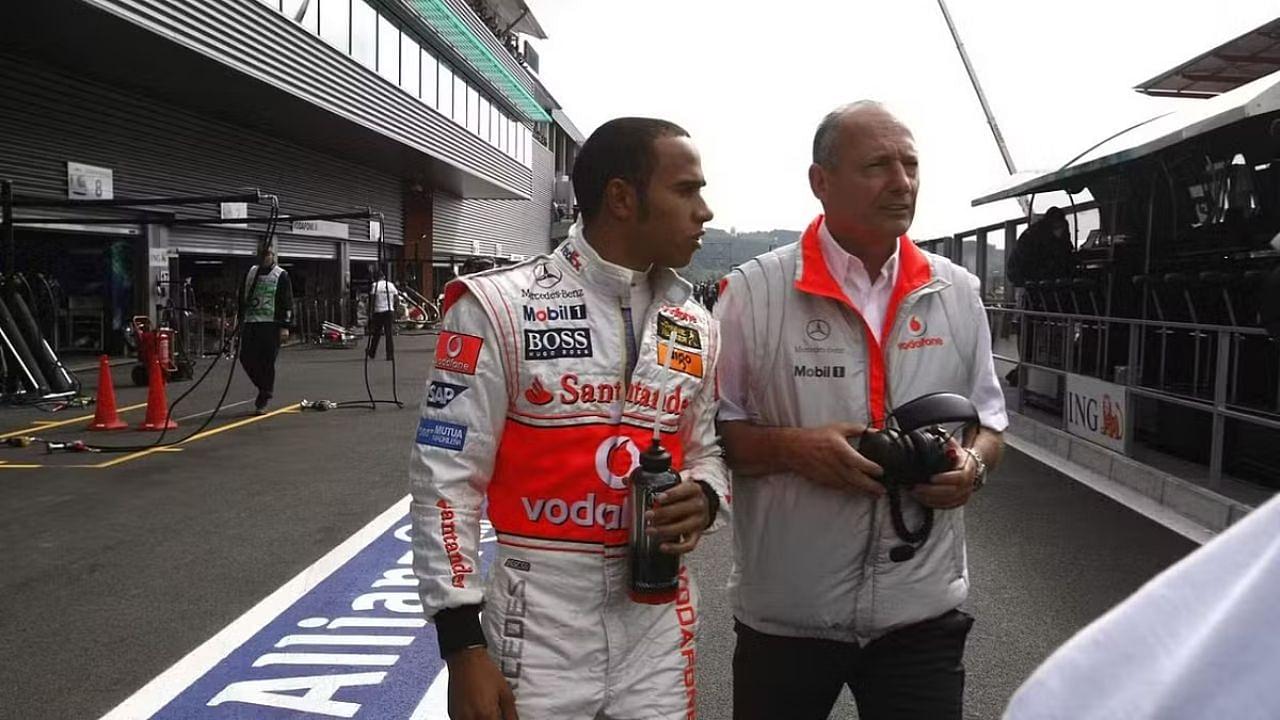If there is any driver who arrived in F1 with the most complete training, it has to be Lewis Hamilton. McLaren and their then-boss, Ron Dennis, left no stone unturned in giving the young Briton everything he needed to get up to speed in F1. This was a decisive advantage that former F1 champion Nigel Mansell believed set his fellow countryman apart.
Mansell believed that had it not been for Ron Dennis’ “cosseting“, Hamilton would not have tasted success as early as he did. Frank Worrall, in Lewis Hamilton: Triple World Champion, quoted Mansell as saying, “McLaren have been way overdue for success. Timing is everything. When a driver can arrive with a team and an engine coming right, it makes a difference. No disrespect to him – I think it was ordained. My story was a lot harder.”
Mansell’s claims are not unfounded. McLaren did indeed do everything to not only train Hamilton but also provide him with a championship-winning car in his rookie season. As for Mansell’s own career, he had to wait for 12 years to win his only F1 championship.
WATCH: The moment Lewis Hamilton became an #F1 World Champion in 2008
️“IS THAT GLOCK?!” –@MBrundleF1 pic.twitter.com/Df06ccgA6g
— FwdSlashF1 (@FwdSlashF1) August 21, 2023
That takes nothing away from Hamilton’s’ ability behind the wheel, though. In his rookie year, he managed to match two-time champion teammate Fernando Alonso on points and lost the championship by just one point to Kimi Raikkonen. A year later, after Alonso’s exit, Hamilton won his first of seven world championships.
As far as Dennis’ contribution to Hamilton’s success goes, the former McLaren boss went out of his way to aid his protege. Dennis once got Hamilton a $22 million simulator to help the Briton sharpen his skills on for six months before his debut.
Mansell’s claim that Hamilton had all the right resources is a common criticism the seven-time champion faces. Many believe he owes his success to the fastest cars on the grid and not his own skill behind the wheel.
Did Lewis Hamilton have it easy as compared to other drivers?
There is no secret that for any driver to win in F1, they need their teams to provide them with a quick car. While the same is obviously true for Lewis Hamilton as well, was it much easier for him to achieve success than some other F1 drivers?
The Briton won his first championship with McLaren in his second season in F1 (2008). He then spent four more years after that with the Woking-based team. The rest of his six titles came at Mercedes when the Silver Arrows enjoyed unprecedented dominance.
That successful run gave birth to the criticism that Hamilton is only good when the car is quick. This is despite the fact that he is statistically the most successful driver in the history of F1.
He has the highest number of race wins (103) and the highest number of pole positions (104) in F1 history. Moreover, he is also tied with Michael Schumacher for the highest number of championships (7).
LEWIS HAMILTON MEDIAN QUALIFYING PERFORMANCE PER YEAR
2007: 0.070s faster than Alonso
2008: 0.288s faster than Kovalainen
2009: 0.256s faster than Kovalainen
2010: 0.343s faster than Button
2011: 0.052s faster than Button
2012: 0.381s faster than Button
2013:… pic.twitter.com/XA5O41hVlC— Holiness (@Big_Data_Master) December 29, 2023
While Hamilton has undoubtedly been lucky to have made some fantastic career choices, it is pertinent to note that he has had three world-championship teammates. He began his career by teaming up with reigning two-time world champion Fernando Alonso.
Once the Spaniard left, 2009 F1 champion Jenson Button joined his fellow compatriot a few years later. Once Hamilton left McLaren to join Mercedes, he teamed up with Nico Rosberg, who beat the 38-year-old for the title in 2016.
Another vital statistic that is pertinent when evaluating Hamilton’s prowess is his ability to outshine his teammates. The Briton has done so time and time again. In fact, only on three occasions in his illustrious career has one of his teammates beaten him. The three drivers are Button (2011), Rosberg (2016), and most recently, George Russell (2022).








